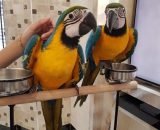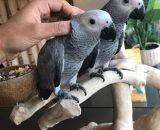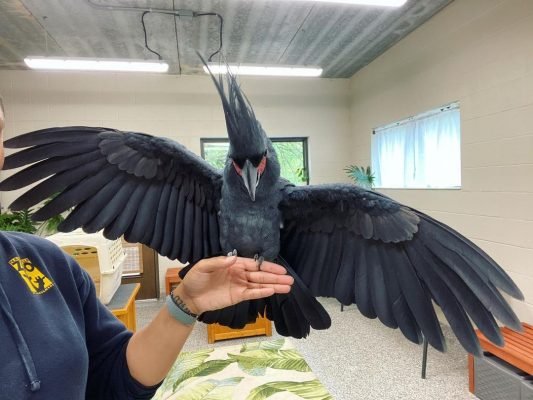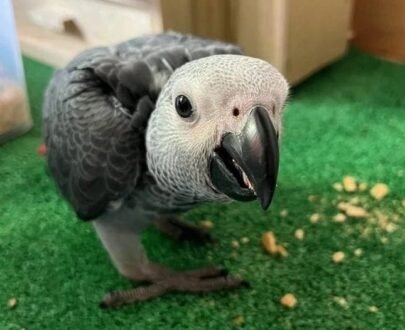The palm cockatoo was originally described by German naturalist Johann Friedrich Gmelin in 1788 as Psittacus aterrimus. Its specific name, Probosciger aterrimus, is from Latin proboscis, long thin nose + -ger, carry, and Latin superlative adjective for ater, black, hence a “black [bird] with a long thin nose (beak)”.
Black Palm Cockatoo for sale, The only member of the monotypic genus, Probosciger, the palm cockatoo is a member of the white cockatoo subfamily Cacatuinae.[3] Earlier limited genetic studies found it to be the earliest offshoot from the ancestors of what have become the cockatoo family.[4][disputed (for: conflict with sources cited above) discuss
Black Palm Cockatoo for sale, The palm cockatoo was originally described by German naturalist Johann Friedrich Gmelin in 1788 as Psittacus aterrimus. Its specific name, Probosciger aterrimus, is from Latin proboscis, long thin nose + -ger, carry, and Latin superlative adjective for ater, black, hence a “black [bird] with a long thin nose (beak)”.
Black Palm Cockatoo for sale, The only member of the monotypic genus, Probosciger, the palm cockatoo is a member of the white cockatoo subfamily Cacatuinae.[3] Earlier limited genetic studies found it to be the earliest offshoot from the ancestors of what have become the cockatoo family.[4][disputed (for: conflict with sources cited above) – discuss]
Black Palm Cockatoo for sale, Four subspecies are recognized,[5] three poorly differentiated and one distinctive. The Cape York cockatoo (P. a. aterrimus), the larger goliath cockatoo (P. a. goliath), P. a. macgillivrayi, intermediate in size, and the northern palm cockatoo (P. a. stenolophus, similar to the goliath, but crest feathers are much narrower).[6]
“Palm cockatoo” has been designated the official name by the International Ornithological Committee (IOC).[5] The species was named the “Goliath Aratoo” in Wood’s Natural History (1862). It is also sometimes given the misnomer “black macaw” in aviculture – the macaws are unrelated New World parrots. Confusingly, this name was also used by early naturalists and Brazilian natives to refer to the dark blue hyacinth macaw.[citation needed]
Description
Black Palm Cockatoo for sale, The palm cockatoo is 55 to 60 cm (22 to 24 in) in length and weighs 910–1,200 g (2.01–2.65 lb).[7] It may be the largest cockatoo species and largest parrot in Australia,
Parrots for sale, although large races of yellow-tailed black cockatoos and sulphur-crested cockatoos broadly overlap in size. It is a distinctive bird with a large crest and has one of the largest bills of any parrot (only the hyacinth macaw’s is larger).
This powerful bill enables palm cockatoos not only to eat very hard nuts and seeds, but also enables males to break off thick (about 1 in) sticks from live trees to use for a drumming display.[8] The male has a larger beak than the female.[7] The beak is unusual, as the lower and upper mandibles do not meet for much of its length, Galah Cockatoo for sale, allowing the tongue to hold a nut against the top mandible while the lower mandible works to open it. The palm cockatoo also has a distinctive red cheek patch that changes colour when the bird is alarmed or excited.
The palm cockatoo has a large and complex vocal repertoire, including many whistles and even a “hello” call that sounds surprisingly human-like. Distinct dialects occur throughout the species’ range.
Black Palm Cockatoo for sale. Anecdotal evidence indicates a palm cockatoo reaching 80 or 90 years of age in an Australian zoo,[9] although the oldest confirmed individual was aged 56 in London Zoo in 2000.[10] Although longevity of captive birds is known, the lifespan of palm cockatoos that live in the wild is still unknown .
Black Palm Cockatoo for sale, Palm cockatoos only lay one egg every second year an
d have one of the lowest breeding success rate
s reported for any species of parrot.[9] Offsetting this is their very long lifespan. A male commenced breeding at 29 in Taronga Zoo in Sydney, and a female at the London Zoo was 40 when she laid her first egg in 1966. Breeding takes place inside tree hollows that look like standing pipes. Fires play an important role in the
destruction and creation of nest hollows. Fires allow the colonisation of microorganisms and termites, which enter the tree and start hollowing out the inside. Cyclones are important in the final stage of nest hollow development. cockatoo parrots For Sale, Parrots for sale,
Buy Scarlet Macaw,
Buy parrots, Macaw parrots for sale, parrots shop,
parrots store, Buy Black Palm Cockatoo, Baby Black Palm Cockatoo for sale, Black Palm Cockatoo parrots for sale
Black Palm Cockatoo for sale, The palm cockatoo was originally described by German naturalist Johann Friedrich Gmelin in 1788 as Psittacus aterrimus. Its specific name, Probosciger aterrimus, is from Latin proboscis, long thin nose + -ger, carry, and Latin superlative adjective for ater, black, hence a “black [bird] with a long thin nose (beak)”.
Black Palm Cockatoo for sale, The only member of the monotypic genus, Probosciger, the palm cockatoo is a member of the white cockatoo subfamily Cacatuinae.[3] Earlier limited genetic studies found it to be the earliest offshoot from the ancestors of what have become the cockatoo family.[4][disputed (for: conflict with sources cited above) – discuss]
Black Palm Cockatoo for sale, Four subspecies are recognized,[5] three poorly differentiated and one distinctive. The Cape York cockatoo (P. a. aterrimus), the larger goliath cockatoo (P. a. goliath), P. a. macgillivrayi, intermediate in size, and the northern palm cockatoo (P. a. stenolophus, similar to the goliath, but crest feathers are much narrower).[6]
“Palm cockatoo” has been designated the official name by the International Ornithological Committee (IOC).[5] The species was named the “Goliath Aratoo” in Wood’s Natural History (1862). It is also sometimes given the misnomer “black macaw” in aviculture – the macaws are unrelated New World parrots. Confusingly, this name was also used by early naturalists and Brazilian natives to refer to the dark blue hyacinth macaw.[citation needed]
Description
Black Palm Cockatoo for sale, The palm cockatoo is 55 to 60 cm (22 to 24 in) in length and weighs 910–1,200 g (2.01–2.65 lb).[7] It may be the largest cockatoo species and largest parrot in Australia,
Parrots for sale, although large races of yellow-tailed black cockatoos and sulphur-crested cockatoos broadly overlap in size. It is a distinctive bird with a large crest and has one of the largest bills of any parrot (only the hyacinth macaw’s is larger).
This powerful bill enables palm cockatoos not only to eat very hard nuts and seeds, but also enables males to break off thick (about 1 in) sticks from live trees to use for a drumming display.[8] The male has a larger beak than the female.[7] The beak is unusual, as the lower and upper mandibles do not meet for much of its length, Galah Cockatoo for sale, allowing the tongue to hold a nut against the top mandible while the lower mandible works to open it. The palm cockatoo also has a distinctive red cheek patch that changes colour when the bird is alarmed or excited.
The palm cockatoo has a large and complex vocal repertoire, including many whistles and even a “hello” call that sounds surprisingly human-like. Distinct dialects occur throughout the species’ range.
Black Palm Cockatoo for sale. Anecdotal evidence indicates a palm cockatoo reaching 80 or 90 years of age in an Australian zoo,[9] although the oldest confirmed individual was aged 56 in London Zoo in 2000.[10] Although longevity of captive birds is known, the lifespan of palm cockatoos that live in the wild is still unknown .
Black Palm Cockatoo for sale, Palm cockatoos only lay one egg every second year an
d have one of the lowest breeding success rate
s reported for any species of parrot.[9] Offsetting this is their very long lifespan. A male commenced breeding at 29 in Taronga Zoo in Sydney, and a female at the London Zoo was 40 when she laid her first egg in 1966. Breeding takes place inside tree hollows that look like standing pipes. Fires play an important role in the
destruction and creation of nest hollows. Fires allow the colonisation of microorganisms and termites, which enter the tree and start hollowing out the inside. Cyclones are important in the final stage of nest hollow development. cockatoo parrots For Sale, Parrots for sale,
Buy Scarlet Macaw,
Buy parrots, Macaw parrots for sale, parrots shop,
parrots store, Buy Black Palm Cockatoo, Baby Black Palm Cockatoo for sale, Black Palm Cockatoo parrots for sale










Customer reviews
Reviews
There are no reviews yet.
Write a customer review